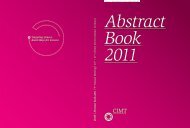Abstract Book 2010 - CIMT Annual Meeting
Abstract Book 2010 - CIMT Annual Meeting
Abstract Book 2010 - CIMT Annual Meeting
Create successful ePaper yourself
Turn your PDF publications into a flip-book with our unique Google optimized e-Paper software.
050 Klobuch | Cellular therapy<br />
T cell receptor RNA transfer into non-reactive human<br />
T lymphocytes turns them into potent CMV-specific effector<br />
cells<br />
Sebastian Klobuch 1 , Katrin Besold 2 , Bodo Plachter 2 , Mirjam H. M. Heemskerk 3 , Niels<br />
Schaft 4 , Ralf-Holger Voss 1 , Matthias Theobald 1 , Wolfgang Herr 1 , Simone Thomas 1<br />
1 Department of Hematology & Oncology, University Medical Center, Mainz, Germany<br />
2<br />
Institute of Virology, University Medical Center, Mainz, Germany<br />
3<br />
Department of Hematology, Leiden University Medical Center, Leiden, The Netherlands<br />
4 Department of Dermatology, University Hospital of Erlangen, Erlangen, Germany<br />
94<br />
Cytomeglovirus (CMV)-associated disease is a<br />
life-threatening complication in patients after allogeneic<br />
hematopoietic stem cell transplantation<br />
(HSCT). Although antiviral drug therapy is successfully<br />
used to reduce the risk of CMV disease,<br />
long-term virus control requires the reestablishment<br />
of protective antiviral T cell immunity in<br />
the host. The latter is challenging, particularly if<br />
the donor is CMV seronegative or possesses only<br />
a weak CMV-specific memory T cell response and<br />
thus, no CMV-reactive T cells are being transferred<br />
from donor to recipient during HSCT. Grafting<br />
nonreactive T cells of CMV seronegative donors by<br />
virusantigen specific T cell receptors (TCR) may be<br />
an efficient means to transfer CMV specific T cell<br />
function into allogeneic HSCT recipients. In this<br />
study, we have reprogrammed T cells of CMV-seronegative<br />
donors with human TCR recognizing the<br />
immunodominant HLA-A*0201- binding epitope<br />
495-503 derived from the CMV pp65 protein. To<br />
overcome the limitations of retroviral TCR gene<br />
transduction that hamper clinical translation, we<br />
used in vitro transcribed RNA encoding CMV-specific<br />
TCR for electroporation of non-reactive human<br />
T cells. After RNA transfection of anti-CD3 stimulated<br />
peripheral blood mononuclear cells (PBMCs),<br />
TCR expression levels were sufficient to trigger<br />
IFN-g secretion and cytolytic activity against pp65<br />
peptide-pulsed target cells and moreover against<br />
human fibroblast upon CMV infection. Due to the<br />
instability of the introduced RNA molecules, TCR<br />
expression and effector function was measureable<br />
for a time period of at least 3 days. We also observed<br />
that TCR RNA transfection of CD4+ T cells<br />
turned them into potent CMVpp65/HLA-A*0201specific<br />
T helper cells. This was demonstrated by<br />
co-incubating them with immature dendritic cells<br />
(DC), which resulted in maturation of DC only in<br />
the presence of the CMV pp65 epitope.<br />
Next, we transfected pure naïve and memory CD8+<br />
T cell subsets isolated from peripheral blood of<br />
CMV-seronegative donors. Although 90% of naïve<br />
CD8+ T cells were CMVpp65/HLA-A*0201 tetramer<br />
positive after electroporation, they mediated only<br />
marginal lysis toward CMV-infected fibroblasts.<br />
In contrast, memory CD8+ T cells showed strong<br />
TCR expression and cytotoxicity upon antigen recognition<br />
up to one week. In summary, our data demonstrate<br />
that non-reactive human T cells can be<br />
easily redirected with CMVpp65 TCR RNA, thereby<br />
gaining CMV-specific T cell effector function for a<br />
considerable time period.<br />
We therefore believe that CMVpp65 TCR RNA has<br />
the potential to be further developed as a therapeutic<br />
‘off-the-shelf’ reagent for CMV-seropositive<br />
patients who undergo allogeneic HSCT from CMVseronegative<br />
donors.



